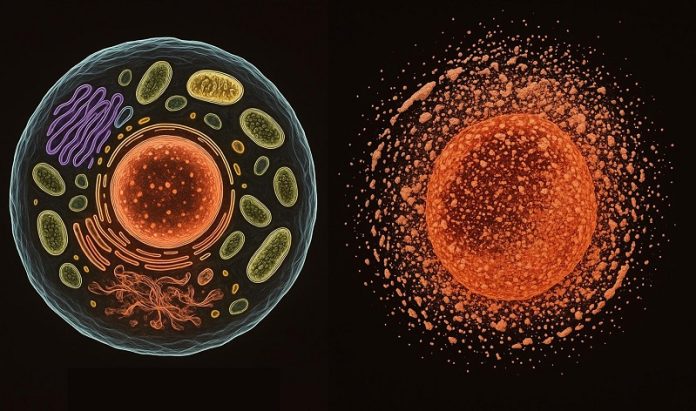
A new study suggests that stopping one particular type of cell death, known as necrosis, could dramatically change the way we treat aging, chronic disease, and even health issues in space.
Researchers from University College London (UCL), biotech company LinkGevity, and the European Space Agency (ESA) believe necrosis may be one of the last great frontiers in medicine.
Necrosis is a chaotic form of cell death that usually happens due to injury, infection, or disease.
Unlike the body’s natural, “programmed” cell death—which allows old cells to make way for new ones—necrosis causes cells to burst and spill harmful chemicals into nearby tissue.
This sets off inflammation and damage, which spreads and worsens over time.
The new research, published in the journal Oncogene, challenges the idea that necrosis is simply the end of the road.
Instead, scientists argue it’s a central driver of biological aging and many age-related diseases—and may be a powerful point of intervention.
Dr. Keith Siew from UCL’s Centre for Kidney & Bladder Health says that even though we rarely talk about it, understanding how and why cells die is crucial. “If enough cells die, tissues die—and then we die,” he said.
“The big question is: what if we could pause or even stop necrosis?”
At the heart of this process is calcium, a mineral that normally exists in tightly controlled levels inside and outside cells.
When this balance breaks down, calcium floods into the cell like a power surge, triggering necrosis. The result is damage that spreads and speeds up tissue aging, leading to conditions like heart disease, Alzheimer’s, and kidney failure.
Kidney disease is a major focus of this research. By age 75, about half of people show signs of it. There’s often no single cause—just a buildup of stress, toxins, or low oxygen over time.
But all roads eventually lead to necrosis, making it a prime target for new treatments. If necrosis can be blocked, even briefly, the damaging cycle could be broken.
The findings also have major implications for space travel. Astronauts face rapid aging and kidney problems caused by microgravity and cosmic radiation. In fact, the kidney has been identified as a potential barrier to long-term space missions.
Dr. Carina Kern, CEO of LinkGevity and lead author of the study, calls necrosis “a hidden driver” of chronic disease and decline. “If we can block it, we could restore healing and even regeneration in aging tissues,” she says.
Researchers hope that future treatments targeting necrosis could improve health on Earth—and support human life far beyond it.
Source: University College London.



